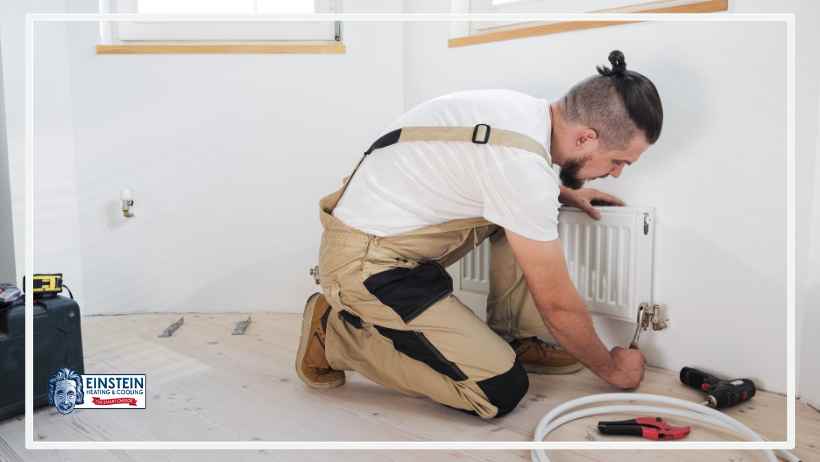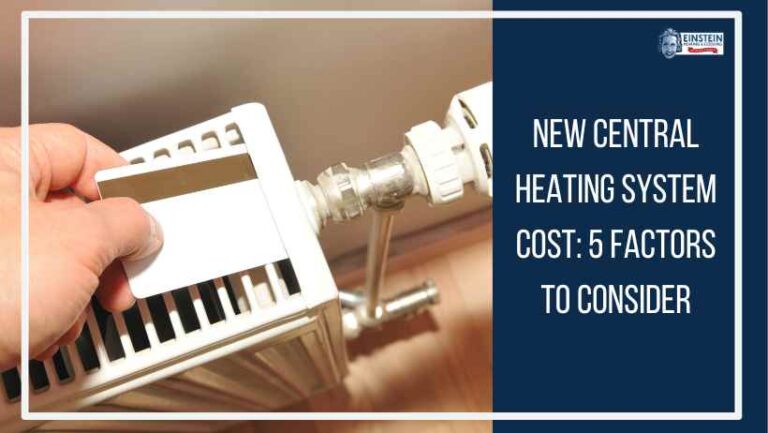Central heating systems serve as the beating heart of our homes, providing warmth and comfort during the chilly seasons. However, understanding the new central heating system cost entails the importance of factors influencing the associated costs. In this in-depth exploration, we will unravel the intricacies of each factor that contributes to the overall expense of acquiring a cutting-edge central heating system.
1. Initial Investment
System Type
- Conventional Systems
Central to the decision-making process is the consideration of conventional central heating systems. These time-tested systems, typically comprising a boiler and radiators, come with a distinct set of costs. Understanding the financial aspects involves assessing the prices of boilers, radiators, and associated pipework. - Combination Boilers
The allure of combination boilers lies in their ability to provide hot water on demand. However, this convenience comes with a price tag. Analyzing the initial investment in combination boilers involves factoring in the cost of the boiler itself, installation charges, and potential upgrades to accommodate the system. - Heat Pumps
Embracing green technologies like heat pumps requires a holistic evaluation of costs. Beyond the purchase of the heat pump unit, considerations include installation expenses, potential modifications to the property, and the long-term energy savings associated with this eco-friendly option.
System Size
- Home Size
The size of the property plays a pivotal role in determining the appropriate heating system size. Larger homes may require more robust systems, impacting the upfront costs. Understanding the correlation between home size and system size is crucial for budgetary planning. - Number of Rooms
The number of rooms directly influences the complexity of the heating system. With each additional room, the need for radiators, pipework, and controls may increase. Exploring how the number of rooms impacts the sizing and cost considerations is vital for an accurate estimate.
Energy Efficiency
- Energy Ratings
Energy efficiency ratings are not merely markers of environmental friendliness; they also influence upfront costs. Investing in a high-efficiency system may entail a higher initial expense but promises long-term energy savings. Deciphering the relationship between energy ratings and costs is crucial for informed decision-making. - Green Technologies
Opting for environmentally sustainable heating solutions aligns with modern values but may come with a premium. Understanding the costs associated with eco-friendly technologies involves considering solar panels, geothermal systems, or other green alternatives, along with their potential long-term benefits.
2. Installation Costs
Professional Installation
- Labor Charges
The expertise of professionals during the installation process incurs labor charges. These charges can vary based on the complexity of the installation, the type of heating system, and local labor rates. Acknowledging the significance of labor costs is integral to estimating the total installation expenditure. - Timeframe
The duration of the installation process influences costs. Quick installations may be more cost-effective, but intricate systems or modifications to existing structures may extend the timeframe and subsequently increase expenses. Understanding how the installation duration impacts overall costs is essential for budget management. - Geographic Location
Geographic location introduces regional variations in labor and material costs. Urban areas may have higher labor charges, while remote locations may incur additional transportation expenses. The topography and unique features of properties in Bend might present installation challenges not found in other regions. These challenges, such as specific ground conditions or the need for special equipment, can contribute to variations in installation costs. - Climate Consider
The cold winters in Bend necessitate heating systems that can efficiently handle low temperatures. This might lead to considerations for more robust or specialized heating systems, potentially impacting the overall installation cost.
Additional Components
- Radiators and Pipework
Radiators and pipework are integral components of central heating systems. The type, size, and quantity of radiators, along with the complexity of pipework, contribute to additional costs. Evaluating the expenses related to these components ensures a comprehensive understanding of the overall investment. - Thermostats and Controls
Advanced heating controls and thermostats enhance system efficiency but come with their own costs. Assessing the expenses associated with these technological components involves understanding the functionalities and potential energy savings they offer.
Compliance and Certification
- Building Regulations
Adhering to building regulations is not just a legal requirement; it also incurs costs. Compliance may necessitate adjustments or upgrades to meet current standards, impacting the overall expenditure. Acknowledging the financial implications of adhering to building regulations is vital for a seamless installation process. - Certification
Securing necessary certifications for the new heating system involves additional costs. From obtaining permits to ensuring compliance with safety standards, factoring in certification expenses is crucial for a hassle-free and legally compliant installation.

3. Operating Costs
Energy Consumption
- Fuel Type
The chosen fuel type significantly influences ongoing operational costs. Gas, electricity, oil, or renewable energy sources each come with their own price tags. Understanding the financial implications of different fuel types is essential for long-term budgeting. - Energy Prices
Fluctuations in energy prices can impact operational expenses. Awareness of market trends and potential price hikes ensures that homeowners are prepared for variations in energy costs over the lifespan of the heating system.
Maintenance
- Regular Servicing
Routine maintenance is the key to a heating system’s longevity, but it comes with its own costs. Budgeting for annual servicing ensures optimal performance and can prevent costly repairs down the line. Understanding the expenses associated with regular maintenance is crucial for responsible ownership. - Repairs
Despite regular maintenance, wear and tear may necessitate repairs, especially during winter, so it’s important to protect your central heating system. Anticipating potential repair costs and factoring them into the overall budget ensures preparedness for unforeseen expenses during the system’s lifespan.
Warranty and Insurance
- Warranty Coverage
Manufacturers often provide warranties for their heating systems, offering financial protection against defects or malfunctions, as finding and getting heating repair can be expensive. Understanding the coverage terms and potential extended warranty options is essential for mitigating unexpected repair costs. - Insurance Policies
Exploring insurance coverage for the heating system provides an additional layer of financial security. Policies that cover accidental damage, breakdowns, or even complete system replacement can offer peace of mind, albeit with associated premiums.
4. Financing Options
Loans and Financing Programs
- Personal Loans
Personal loans present a flexible financing option for those looking to spread the initial investment over time. Understanding the terms, interest rates, and repayment schedules ensures that the financing arrangement aligns with the homeowner’s financial situation. Fixing mechanical parts of an HVAC system can be costly, hence financing programs can help you enjoy comfortable temperatures in the winter. - Government Grants
Government grants and subsidies exist to promote energy efficiency. Navigating the landscape of available grants involves understanding eligibility criteria, application processes, and the extent of financial support. - Financing Programs
Manufacturers or utility companies often offer financing programs. Exploring these options involves evaluating interest rates, repayment terms, and any additional benefits or incentives associated with specific financing programs.
Return on Investment
- Energy Savings
Investing in an energy-efficient heating system promises long-term savings on energy bills. Calculating the potential energy savings over the system’s lifespan provides insight into the return on investment and justifies the initial expenditure. - Property Value
A new central heating system can enhance the overall value of a property. Understanding the potential impact on resale value and property appraisal ensures that the investment aligns with broader financial goals.
5. Environmental Considerations
Carbon Footprint
- Green Technologies
Opting for eco-friendly heating solutions contributes to a reduced carbon footprint. Understanding the environmental benefits involves assessing the emissions associated with the chosen heating system and its long-term impact on sustainability. - Energy Efficiency
Beyond financial considerations, the energy efficiency of a heating system directly influences its environmental footprint. Choosing a system with high energy efficiency contributes to reduced energy consumption and, consequently, lower environmental impact.
Sustainability
- Lifespan of Components
The longevity of heating system components directly impacts sustainability. Assessing the expected lifespan of boilers, radiators, and other elements ensures that the system remains environmentally viable over an extended period. - Disposal and Recycling
Responsible disposal of old heating components and recycling materials contribute to sustainability. Understanding the options for disposal and recycling ensures that the environmental impact of the heating system is considered beyond its operational phase.
How much will be the estimated new central heating system cost?
As a rough estimate:
Conventional Systems:
- For a conventional gas boiler central heating system, the cost could range from $3,000 to $7,000 or more, depending on the brand, efficiency, and complexity of the installation.
Combination Boilers:
- The installation cost for combination boilers might be in the range of $4,000 to $8,000, but this can vary based on factors like the brand, size, and any additional work required for heating system installation.
Heat Pumps:
- Heat pump systems, including installation, can have a broader range, typically starting from $5,000 and going up to $15,000 or more. The cost is influenced by factors like the type of heat pump, its efficiency, and the complexity of the installation.
To get an accurate estimate for your Bend residence, it’s advisable to contact local heating professionals from Einstein Heating and Cooling, and discuss your home’s unique requirements with them. They can assess your property, recommend suitable systems, and provide a detailed breakdown of costs based on your needs.
In conclusion
Embarking on the journey of acquiring a new central heating system necessitates a meticulous examination of various financial factors. From the initial investment in the chosen system type to ongoing operational and maintenance costs, homeowners can make informed decisions by understanding all the factors that come into play. Balancing budgetary constraints with environmental considerations as well as trusting the experts as Einstein Heating and Cooling ensures a heating system investment that not only warms homes but also aligns with modern values and long-term financial goals.








